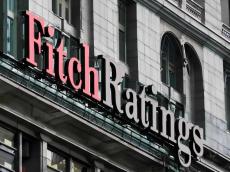|
|
TODAY.AZ / Business
Azerbaijan's rating by Fitch remains stable
17 February 2024 [11:11] - TODAY.AZ

International rating agency Fitch Ratings has affirmed Azerbaijan's long-term foreign currency issuer default rating (IDR) at "BB+" with a positive outlook, the rating agency says, Azernews reports.
It is noted that the rating is supported by Azerbaijan's very strong external balance sheet, low public debt and high financial flexibility due to large assets of the sovereign fund.
"The current account surplus doubled to 14.8% of GDP in 2023, but remains the highest in the 'BB' category. Despite lower oil prices (oil and gas revenues account for 90% of total exports), we expect the surplus to remain strong in 2024-2025. Sovereign foreign exchange assets in 2023 rose to $ 69.8 bln, of which 80% is held by the State Oil Fund of the Republic of Azerbaijan (SOFAZ), continuing to reflect strong energy revenues and record high returns in SOFAZ's investment portfolio.
Azerbaijan's net sovereign asset position, projected at 67% of GDP in 2023, remains stable in 2024-2025, the highest among countries in the same group," Fitch added.
"Average inflation fell to 9% in 2023 and was supported by the manat's strong position relative to Azerbaijan's main trading partners and lower global food prices. We forecast it to fall to 4.5% in 2024, slightly above the 4% 'BB' average forecast."
As annual inflation is within the Central Bank of Azerbaijan's target range (4%±2pps), the Central Bank has cut the key rate by 125 percentage points to 7.75% since November," the agency said.
Fitch said the pace and extent of further easing of inflation will depend on risks from high commodity prices and demand-side pressures, such as strong wage increases and the performance of government spending.
"Growth has eased markedly to 1.1% in 2023, reflecting a slowdown in the oil and gas sector and a softening of post-pandemic growth in some key non-oil sectors, especially transportation. We expect growth to recover to 2.8% in 2024 and 2.5% in 2025, supported by public investment, while new oil production could slow the downturn in the energy sector," Fitch said.
The agency, however, believes that significant government involvement, governance difficulties, limited access to financial resources, and low investment in the non-oil sector are hindering progress towards economic diversification.
URL: http://www.today.az/news/business/244976.html
 Print version
Print version
Connect with us. Get latest news and updates.
See Also
- 18 February 2025 [15:21]
2025 Agrarian Business Festival to kick off in Imishli - 18 February 2025 [13:18]
Azerbaijan, Qatar central banks discuss strengthening cooperation - 18 February 2025 [12:43]
Shah Deniz Compression Platform to be Azerbaijan's 1st unmanned facility - 17 February 2025 [13:19]
Caspian Economic Forum kicks off in Tehran with regional trade and transport on agenda - 17 February 2025 [12:21]
Azerbaijan and IsDB discuss expanding cooperation in Islamic finance - 17 February 2025 [10:49]
OTS to hold key summits in Azerbaijan in 2025 - 14 February 2025 [15:58]
Major reconstruction of M3 highway near Bilasuvar completed - 14 February 2025 [12:56]
ASAN Service signs 25th service model agreement, expands to Colombia - 14 February 2025 [12:37]
Azerbaijan's last kolkhoz transformed into Ivanovka agro-park - 13 February 2025 [14:59]
Azerbaijan, ADB discuss urban development cooperation
Most Popular
 Chief of the Armenian General Staff also became blogger
Chief of the Armenian General Staff also became blogger
 Non-Russians of Karabakh as a tool in the information war against Baku
Non-Russians of Karabakh as a tool in the information war against Baku
 Pashinyan takes revenge on his ambassador for the failure in Munich
Pashinyan takes revenge on his ambassador for the failure in Munich
 Samvel Babayan: now the builder of the "opposition front" and at the same time the tender "wizard"
Samvel Babayan: now the builder of the "opposition front" and at the same time the tender "wizard"
 France's phobia of Azerbaijan still puts Macron’s government in a bind
France's phobia of Azerbaijan still puts Macron’s government in a bind
 President Ilham Aliyev reviewed conditions at “Aghdam Residence” residential complex
President Ilham Aliyev reviewed conditions at “Aghdam Residence” residential complex
 President Ilham Aliyev inspects construction progress at nursery-kindergarten No.1 in Aghdam city
President Ilham Aliyev inspects construction progress at nursery-kindergarten No.1 in Aghdam city
